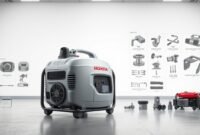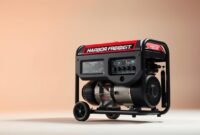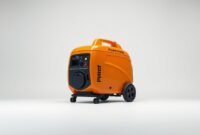Power outages can turn your home into a nightmare. You’ll be left in darkness with dead electronics and spoiled food. Many homeowners struggle to figure out how many watts they need for a house generator.
Choosing the right house generator is more than just buying power. It’s about keeping your family comfortable and safe. In this guide, I’ll explain how to pick the perfect generator size. We’ll cover everything from wattage requirements to calculating your home’s total power needs.
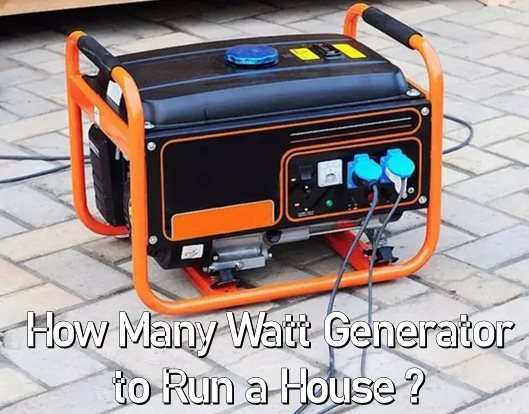
Whether you’re preparing for severe weather or looking for backup power solutions, this guide will help. You’ll learn how to confidently choose the right generator for your home.
Understanding Generator Wattage Basics
Choosing the right generator for your home starts with understanding wattage. Generators have two important measurements: running wattage and starting wattage. These terms are key to finding the right power for your needs.
Running wattage is the power needed to keep appliances running. Starting wattage is the extra power needed to start devices like refrigerators or air conditioners. This extra power is often much higher than the running wattage.
Running vs Starting Wattage: What’s the Difference?
Most electrical devices need two types of power:
- Running wattage: Power needed for normal use
- Starting wattage: Extra power needed to start an appliance
Starting wattage is usually three times the running wattage. For example, a 500-watt device might need 1,500 watts to start.
Surge Power Requirements
Surge power is important when choosing a generator. Devices with motors or compressors need extra power to start. Not accounting for this can cause generator overload or damage to devices.
| Appliance | Running Wattage | Starting Wattage |
|---|---|---|
| Refrigerator | 600 watts | 1,800 watts |
| Window AC Unit | 900 watts | 2,700 watts |
| Microwave | 600 watts | 1,000 watts |
Power Calculation Fundamentals
To find the right generator, add the running and starting wattage of all devices you’ll use at once. Make sure to choose a generator that can handle more power than you need. This ensures it works well.
Types of Home Generators Available
Choosing the right generator is key for powering your home during outages or in remote areas. Not all generators are the same. Knowing the differences helps you pick the best one for your needs.
I’ve looked into the three main home generator options. They meet different power needs for households:
Portable Generators: Flexible Power Solutions
Portable generators are very flexible for homeowners. They are small and easy to move. They’re great for:
- Camping and outdoor events
- Emergency backup during short power outages
- Powering tools at construction sites
- Providing temporary electricity in remote locations
Inverter Generators: Advanced Technology
Inverter generators are the latest in generator tech. They give clean, stable power that’s safe for sensitive electronics. Their benefits include:
- Quiet operation
- Fuel efficiency
- Lightweight design
- Safe for powering smartphones, laptops, and medical equipment
Whole House Standby Generators: Complete Power
Whole house standby generators offer complete power protection. They are permanent and turn on automatically during outages. This ensures your home stays powered up.
Read also: Kohler Standby Generator
These generators connect directly to your home’s electrical system. They support important appliances and keep you comfortable during long outages.
How Many Watt Generator to Run a House
Finding the right power for your home generator is like solving a puzzle. You need to think about several important factors. The power needed depends on your home’s needs and the devices you want to keep running when the power goes out.
Here are the main things to consider when choosing the right generator wattage:
- Assess your essential appliances and their power consumption
- Calculate the starting and running watts for major electrical systems
- Consider the size of your home and total electrical load
Homes need different amounts of power based on their size and electrical needs. A small home might need a 3,000-5,000 watt generator. Larger homes might need 7,500-10,000 watts to keep important systems running.
To figure out the power needed, make a detailed list of essential appliances. Start with important systems like refrigerators, heating and cooling, and medical devices. This will help you find the exact wattage generator needed to keep your home running smoothly during power outages.
- Small homes (up to 1,500 sq ft): 3,000-5,000 watts
- Medium homes (1,500-2,500 sq ft): 5,000-7,500 watts
- Large homes (2,500+ sq ft): 7,500-10,000 watts
Choosing the right generator is about finding the right balance. It’s better to have a bit more power than to not have enough when you need it most.
Essential Appliance Power Requirements
Knowing how much power your home appliances need is key when picking a generator. Each device uses different amounts of electricity. This affects how you manage your power. Let’s look at the power needs of important home appliances to guide your choices.
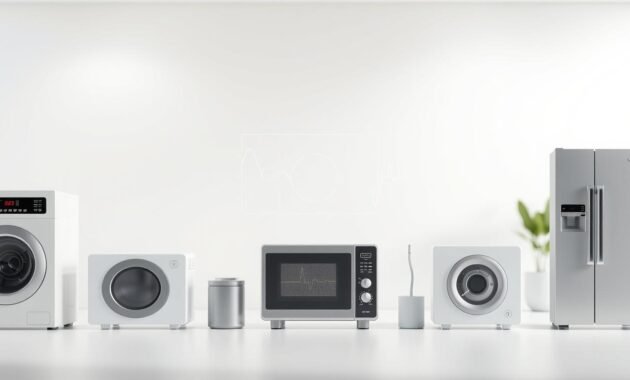
Kitchen Appliances Wattage
Kitchen appliances use a lot of power. Here’s what you need to know:
- Refrigerator: 600-800 watts (startup can require 1200 watts)
- Electric Range: 2,500-3,000 watts per burner
- Microwave: 600-1,500 watts
- Dishwasher: 1,200-2,400 watts
HVAC System Power Needs
Air conditioning systems use a lot of electricity. Central air conditioning needs 2,000-4,000 watts. A 2.5-ton unit might use about 3,500 watts.
Basic Home Electronics
Home electronics also use different amounts of power. This can add up fast:
- Television: 100-400 watts
- Desktop Computer: 200-500 watts
- Gaming Console: 90-150 watts
- Laptop: 50-100 watts
Knowing these power needs helps you figure out the right generator size. This ensures your essential appliances work during outages.
Calculating Your Home’s Total Power Needs
Choosing the right generator starts with knowing how much power your home needs. I’ll show you a simple way to figure out your electrical needs.
First, make a list of all the important appliances and devices you need to keep running during a power outage. This list will help you know exactly how much power your generator needs.
- List all critical electrical devices
- Check the wattage of each appliance
- Calculate running and starting power needs
To find out your total power needs, follow these steps:
- Add up the running wattage of all devices
- Find the highest starting wattage among your appliances
- Add a 10-20% buffer for unexpected power surges
Pro tip: Focus on must-haves like refrigerators, medical equipment, and phones. This way, you make sure you pick the best generator for your home’s needs.
Remember, different appliances use different amounts of power. A fridge might need 700 watts, but a sump pump could need 1,500 watts to start. By calculating carefully, you avoid overloading your generator and keep your important systems working well.
Choosing Between Natural Gas and Propane Generators
When picking a whole house generator, the fuel type is key. Natural gas and propane generators have their own benefits for homeowners. They help ensure reliable backup power.
Read also: How to Choose the Best Whole House Generator
Choosing a generator means looking at several important factors. These factors affect how well the generator works and its cost over time.
Fuel Efficiency Comparison
Natural gas generators are often more fuel-efficient than propane ones. They have several advantages:
- They get fuel from municipal gas lines all the time.
- They cost less per kilowatt-hour to run.
- They burn cleaner, which means fewer emissions.
Cost Considerations
The cost of owning a generator is more than just the initial price. Natural gas generators are often cheaper to run because of:
- Stable fuel prices.
- They connect directly to your home’s gas lines.
- They need less maintenance.
Installation Requirements
Installing a generator can be different for natural gas and propane types. Important things to think about include:
- How close your home is to gas lines.
- Local rules about utilities.
- Your home’s current energy setup.
In the end, what’s best for you depends on your home and local energy options.
Read also: Kohler Natural Gas Generator Review
Generator Size Categories for Different Home Sizes
Choosing the right generator for your home is important. It depends on your home’s size, power needs, and lifestyle. Let’s look at different generator sizes to help you decide.
Generators come in all sizes, from small 500-watt units to big 10,000-watt systems for whole homes. Knowing your power needs is essential for picking the right one.
- Small Apartments (500-2,000 watts)
- Essential electronics
- Minimal appliance backup
- Medium Homes (3,000-5,500 watts)
- Multiple critical appliances
- Partial home coverage
- Large Family Homes (7,000-15,000 watts)
- Complete home power
- All major systems supported
The climate and how much energy your home uses also matter. Homes in stormy or power-outage-prone areas might need bigger generators for full protection.
| Home Size | Generator Watts | Coverage |
|---|---|---|
| Small Apartment | 500-2,000W | Basic Electronics |
| Medium Home | 3,000-5,500W | Critical Appliances |
| Large Family Home | 7,000-15,000W | Full Home Power |
When picking a generator, get a pro’s advice to fit your exact needs. An electrician can give you the right wattage for your home.
Safety Considerations and Installation Guidelines
When picking a generator for your home, safety is key. Right installation and upkeep stop dangers and give steady power in emergencies. A house generator needs careful planning and focus on key safety steps.
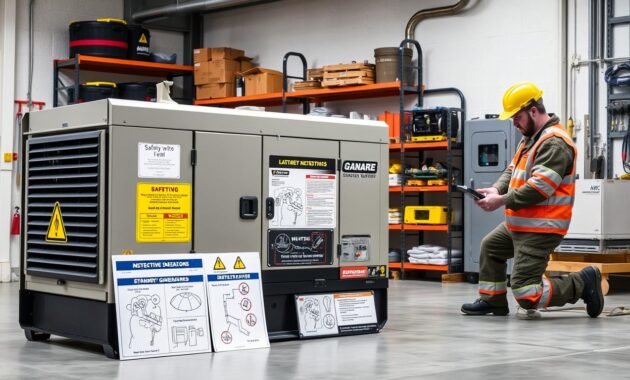
Where you put your generator is very important for safety. I suggest placing it at least 20 feet from your house. Make sure the exhaust goes away from windows and doors. This stops dangerous carbon monoxide and lowers risks.
Proper Ventilation Requirements
Ventilation is a big deal for generator safety. Generators make harmful gases that can be deadly if not handled right. Important ventilation tips include:
- Make sure it’s in open air with no blocks
- Keep it away from closed spaces
- Check the wind direction when it’s running
- Put carbon monoxide detectors near where exhaust might go
Transfer Switch Installation
Getting a transfer switch installed by a pro is vital for your house generator. It stops dangerous electrical backflow and guards your home’s electrical system during outages.
Maintenance Protocols
Regular upkeep keeps your generator safe and efficient. I recommend making a detailed maintenance plan that includes:
- Monthly checks to see if everything looks good
- Quarterly checks on the fuel system
- Annual service by a pro
- Keeping records of all maintenance
By sticking to these safety tips and installation rules, you’ll get a dependable and safe power solution for your home.
Power Management and Load Planning
Choosing the right generator means understanding power management. Smart load planning can make your generator last longer. It also keeps your electricity on when it matters most.
Good power management starts with knowing your generator’s power limit. Experts say to use no more than 90% of the power to avoid damage. This keeps your generator running well and prevents sudden stops.
- Prioritize essential electrical loads
- Distribute power consumption evenly
- Use energy-efficient appliances
- Implement strategic power rotation
To get the most from your generator, make a power use map. It shows which appliances use the most power. This helps you balance their use during emergencies.
| Appliance Category | Power Priority | Estimated Watts |
|---|---|---|
| Refrigerator | High | 600-800 watts |
| Medical Equipment | Critical | 200-500 watts |
| Lighting | Medium | 100-300 watts |
| Electronics | Low | 50-200 watts |
By using these power management tips, your generator will work better. It will give you reliable backup power when you need it.
Conclusion
Choosing the right generator for your home is a big decision. It requires careful planning and knowing your power needs. You need to find a balance between performance, safety, and cost.
It’s not just about the wattage. You must match your home’s electrical needs. Start by listing your essential appliances and their power use. This helps ensure you have backup power when you need it.
Safety is key when picking and setting up a generator. Whether you choose a portable or a whole-house system, proper installation and maintenance are vital. Take the time to research and get professional advice to keep your home and family safe.
Your generator is an investment in peace of mind. By understanding your power needs and choosing wisely, you’ll be ready for any electrical emergency.
